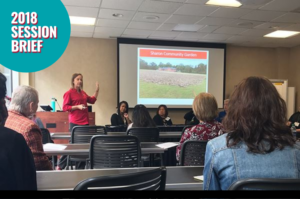By Prajakta Dhapte
 Lack of access to healthy food, worries about food insecurity and unhealthy diets are major concerns in Georgia, and several non-profit and government organizations are working diligently to address the issues.
Lack of access to healthy food, worries about food insecurity and unhealthy diets are major concerns in Georgia, and several non-profit and government organizations are working diligently to address the issues.
Strategies such as community gardens, farm-to-school programs and food-sharing were among the solutions shared by panelists last month during the seventh annual State of the Public’s Health Conference at the University of Georgia.
Speakers from the Georgia Farm to Early Care and Education Coalition, Everybody Eats Fresh Free Fridays Network and Healthier Together outlined local initiatives.
But they also noted the limited scope of the efforts and said there is more work to be done to expand the positive outcomes to more communities across the state and nationwide.
Denise Everson, program development coordinator for Healthier Together, encouraged attendees to turn troubling health statistics into opportunities to deploy new strategies.
“When you get the prize for being a community with a high rate of obesity…it creates a unique opportunity,” she said. “Not only [to address] issues related to the obesity rate, but also chronic disease-related issues.”
That’s what led Healthier Together— a two-year initiative that uses federal funding to introduce community-based interventions— to Taliaferro County, about 90 miles east of Atlanta. There were no fast-food outlets in the county, but there were also no grocery stores.
“You would need to drive out of the county to find one. Which is why they identified access to healthy food as something that they wanted to work on as a community,” said UGA healthy living specialist, Courtney Brown. She was one of the panelists, and part of a university program that collaborates on local efforts.
Healthier Together introduced a community supported agriculture program that included a community garden, and a student-sustained vegetable garden that offers fresh produce at the local elementary school and an area farmer’s market.
A similar mission was outlined by the Georgia Early Care and Education Coalition, with a focus on children ages six and younger. “Starting early is our mantra,” said Roslyn Johnson-McCurry, a board member and trainer for the program.
The goal is to link young people to healthy produce, educate them about nutrition and engage them in hands-on activities, like gardening. “Children learn by doing,” said Johnson-McCurry.
The program is beneficial in multiple ways: “We are helping [teachers] develop a curriculum where the children are actively engaged. So they’re doing their own gardening and not just watching their teachers,” she said.
The early care program estimates it may affect the lives of eight million children enrolled in early child-care settings, by introducing them to the healthy behaviors that can have long-lasting effects, like reducing obesity rates. An estimated 22.8 percent of children ages two to five are overweight or obese, according to Johnson-McCurry’s research.
“Obesity places them at risk of what used to be adult onset diseases… or conditions you would normally see in older people like diabetes, high-blood pressure and cholesterol,” Johnson-McCurry said.
Still, while some programs are introducing better food choices into the community, others turned their focus to reducing food waste.
On a field trip to a local food bank, Savannah-area teenagers Ilya Snyder and Jonathan Gibson learned that unused food was thrown away at the end of every week. That inspired the 2012 launch of Everybody Eats Fresh Free Fridays, an effort to increase access to healthy foods for populations that face food insecurity, poverty and those living in food deserts.
Instead of allowing unused food to be tossed, the project collects it from the America’s Second Harvest of Coastal Georgia food bank and redistributes it to those in need. So far, the administrators say, it has distributed nearly 48 tons of produce to families in need, with about 180 individuals being served every Friday each month at all of its sites.
“What’s nice is we are solving two problems at once— connecting people with healthy foods and also preventing waste,” said Cristina Pasa Gibson, chronic disease prevention director of the Coastal Health District in Savannah and one of the founder’s mom.
